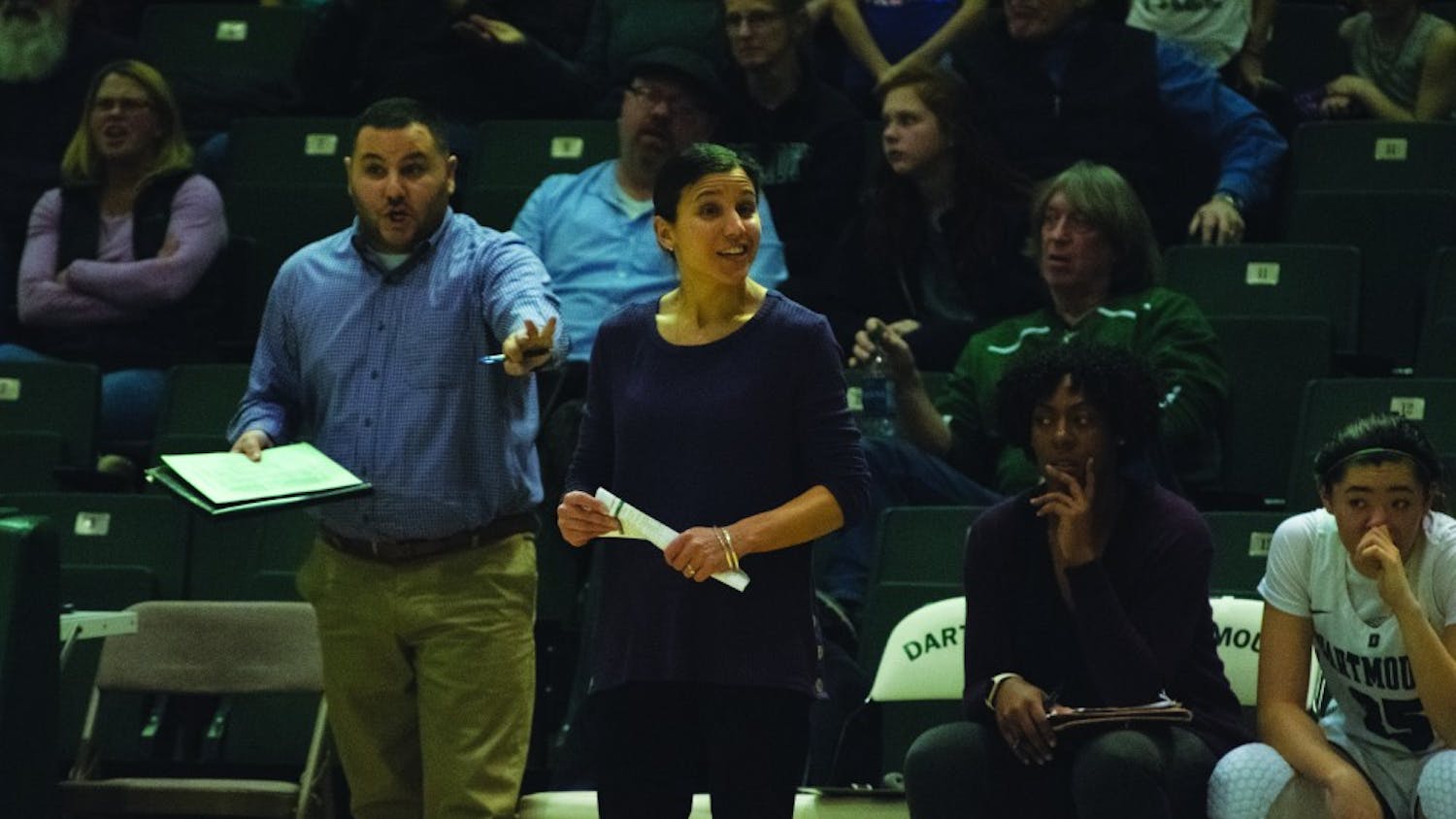Kylie Palacios was finishing her second year at Dartmouth when she received her financial aid award letter in May 2019 for the upcoming sophomore summer term.
“I remember seeing it and immediately being like, ‘I don’t think I pay this much,’ and being really confused,” Palacios said.
Though Palacios’ situation is somewhat rare relative to the cases of most Dartmouth students, her situation is one that affects students who struggle to make ends meet for tuition payments — some of whom are forced to leave Dartmouth.
After inquiring further with the College’s financial aid office, Palacios learned the her financial aid package had changed because her older sister had graduated college and her father’s income had increased.
However, Palacios noted that her father had an increased salary because he had picked up several hours a week of overtime in order to pay off her tuition last year, while her sister had attended her university on a full-ride scholarship.
“It wasn’t extra hours, it was all overtime that he’d been killing himself over,” Palacios said.
Following advice from the financial aid office, Palacios wrote a letter of appeal explaining her situation, including her accomplishments at the College and factors such as the high cost of living in southern California. After about a week of waiting, her family received a response.
“It pretty much said we looked over everything, but this tuition stays,” Palacios said. “This is how our math works — sorry, bummer.”
After meeting in person with a financial aid officer, she received the same answer.
“She said I could take out more loans, but I’m like 40 grand in debt and I’m a sophomore,” Palacios said. “I can’t do that.”
Palacios noted that she would have been a member of the Class of 2021. Because she received her financial aid package after transfer university deadlines had passed, she said she is currently working at home and plans to apply to transfer to a different university for the upcoming fall after fulfilling classes at her local community college.
In an interview with The Dartmouth, Dartmouth’s director of financial aid Dino Koff noted that his office works with students to support them and problem-solve when their financial aid packages change. Despite these efforts, students sometimes have to leave the College, which Koff said was the case for a couple of students this year.
“We lost a couple of students this year, and the parents — one of them was very frustrated because they’re not paying another school tuition and they wanted us to do the same award with two kids in college — well, we can’t do that,” Koff said. “It’s both a federal and institutional issue, and it’s always very difficult. I think our goal is to be as transparent and up front as possible.”
Dartmouth’s total cost of attendance for the 2019-20 school year, including direct and estimated indirect costs, is approximately $77,000.
According to Koff, though a shrinking number of schools are actually offering 100 percent demonstrated need-based aid, Dartmouth and its peers in the Ivy League still stand by the commitment.
Need, as described on the College’s website, is the total cost of attendance, including direct and indirect expenses, minus family contribution. For families with a total income of $100,000 and less, tuition is free and the financial aid offer does not involve loans.
Koff noted that the College used both the federal methodology as well as its own institutional methodology to determine financial aid for students. He also noted that his office will work with the ability of families to create a financial aid package that covers all the demonstrated need while considering work-study, summer earnings and scholarships.
“[If a] family has the ability to pay, say, $10,000 in this example, we will come up with an award that will cover the rest.”
He said that the financial aid office takes several factors into account for financial aid packages, including federal income tax returns, savings, investments and asset information. According to Koff, the office begins by working with prospective students. Prospective students fill out federal, institutional and college scholarship service forms to contribute to a greater in-depth needs analysis review — ideally during the admissions cycle so that they can receive a financial aid award letter with their admissions letter.
Current students must reapply for aid every year by submitting documentation about their family’s financial situation, which includes the Free Application for Federal Student Aid, college scholarship service documentation and Dartmouth’s scholarship application.
Even with this process in place, students with evolving financial situations like Palacios can find their changing aid offers to be a financial burden. A former student from the Class of 2022 who spoke with The Dartmouth on the condition of anonymity shared a similar situation.
“I dreamed of going to Dartmouth ever since I was a kid, and when I did finally get accepted it was this crazy dream come true,” she said. “I had an incredible year. I met all my best friends, I was on the equestrian team, part of the Native American department, in Global Leaders, Christian Union, met my boyfriend — it was an absolutely perfect year and I couldn’t have loved Dartmouth more.”
However, when the student’s parents visited for parents’ weekend last spring, her parents said that her financial aid might change, which they attributed to not reading the “fine print” of her financial aid documentation carefully enough.
On the last day of finals, the student received a letter from the financial aid office informing her that her expected family contribution had more than doubled.
After meeting with a representative from the College’s financial aid office, the student said that she learned that the change was caused by an income increase from both her parents, as well as her older brother’s graduation from college.
She noted that these changes were not representative of her actual situation, as her parents are divorced and her mother does not contribute to her education financially. She also noted that her older brother was enrolled in medical school for the coming year. Additionally, she said that her father, who is her primary caregiver, had not received an actual income increase, but one-time payouts for working at his job for 29 years.
The student applied for an appeal after communicating with the financial aid office, which led to an increase in aid by $6,000, according to the student. However, she noted that it was “not much of a dent” compared to her expected contribution. According to the student, to continue her education at Dartmouth, she would have had to go into $62,000 of debt.
“The only reason I left Dartmouth was because I couldn’t pay for it anymore ... it made me realize that the school is more of a business than I thought it was and that it didn’t hurt them to let me go,” the student said.
By the time the financial aid office responded to her appeal at the end of the summer, the student said that most schools had closed their transfer applications. She added that the delay led to her having to take a year off before continuing her education at a public college with lower tuition.
A similar factor affecting the financial aid packages of both Palacios and the anonymous student is a sibling graduating from college.
“For families that have two students in college at once, our whole goal is transparency,” Koff said. “For the first year when we’re admitting a student, we’ll put our direct and indirect costs, [and] what family contribution would be if there was only one in college ... so we put that on all award letters and we even take that a step further on the second page to put estimated bills.”
Koff declined to comment specifically on individual students’ cases, citing FERPA regulations.
Because families are required to apply for financial aid each year, financial aid packages differ depending on changing factors. Expected family contribution can fluctuate depending on how many siblings are enrolled in college at the same time.
According to Koff, the College’s award letter and sibling verification forms note that if a sibling is no longer enrolled in college, it will impact their financial aid package.
“We’re constantly, ahead of time, working with families if we’re talking to them on the big picture,” Koff said. “It goes in both directions as a positive.”
Koff said that the College employs a “teamwork approach” in which parents, the government and possible outside community resources support a financial aid recipient. According to Koff, when it comes to families with children graduating, Dartmouth considers need-based aid with expected parental contribution on a case-by-case basis.
“The emphasis on undergrad is the goal for everyone to have an undergraduate degree,” Koff said. “As we go to graduate schools, it is much tougher financially. There’s a lot less aid that’s available.”
Koff also noted that there is a discrepancy between demonstrated need and willingness to pay.
“Everybody’s perception is different. We’re giving out $112 million this year of need-based aid ... sometimes the willingness to pay is different than the need we’re coming up with,” Koff said.
Palacios said that Dartmouth could be more transparent about financial aid changes.
“There’s always the small print at the bottom that says stuff, but it’s one of those things where my family had never known how to navigate a college before since my sister was on a full ride,” Palacios said.
The anonymous student also expressed similar sentiments about the College’s transparency regarding changes to financial aid packages.
“There’s no doubt that it was under the rug,” the student said. “It’s there if you bring it up — they can say it was there in your letter but it’s very under-emphasized. On the financial aid website it’s just the big letters, ‘We meet 100 percent of demonstrated need,’ but I would have benefited [from] a better understanding of how things were going to go.”
The College is currently working to decrease its reliance on loans.
The Call to Lead, Dartmouth’s $3 billion capital campaign that was announced in April 2018, includes around $500 million for financial aid and a commitment that Dartmouth students will not have to take out loans.
According to Koff, the College is currently “no-loan” for families earning under $100,000, which constitutes around 270 students in the Class of 2023. For families making over $100,000, Dartmouth awards between $4,500 to $5,500, along with scholarship and work-study to meet student need.
“Our goal with the capital campaign is to be able to remove the loan being awarded,” Koff said. “It won’t mean loan debt will go away, because we’ll still have students borrowing on their own, but it does mean we won’t be awarding that loan.”
Despite initiatives such as The Call to Lead, fluctuations in financial aid packages still carry uncertainty. For students such as Palacios, those fluctuations meant that staying at Dartmouth was not an option.
“I couldn’t pay for college anymore — it got too expensive,” Palacios said. “If I had known that I would’ve had to pay those costs before coming to Dartmouth, I wouldn’t have gone.”



